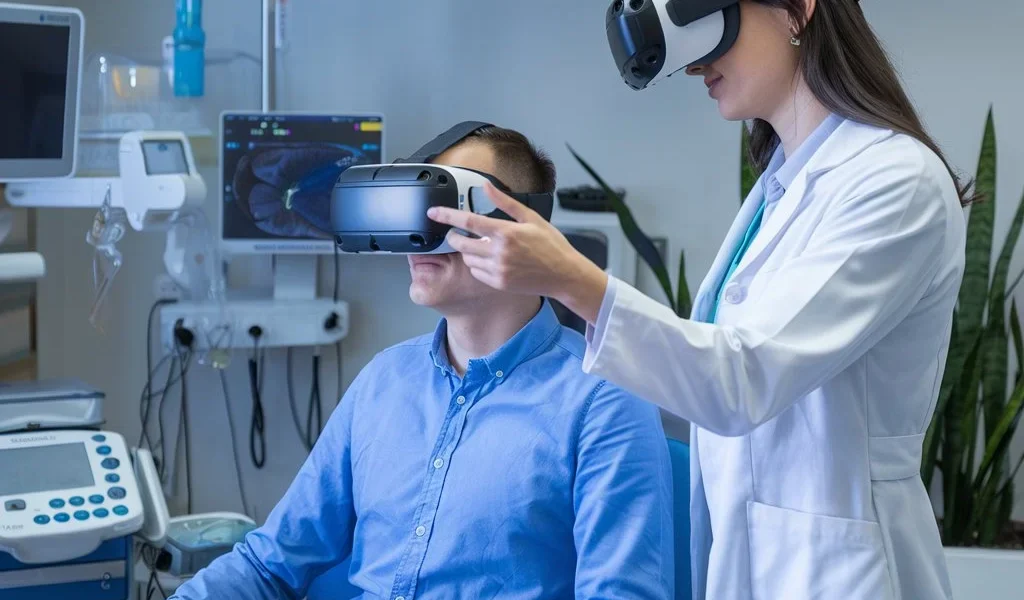The field of personalized medicine is changing the healthcare industry by providing a more individualized and individual-focused approach to treatment. One-size-fits-all treatments are a thing of the past; modern developments enable precise diagnosis and therapy based on individual genetic, environmental, and lifestyle factors. Upon exploring the latest developments in customized medicine, it is evident that innovation is propelling a paradigm shift in our comprehension of health and illness. This industry is changing quickly, from big data and artificial intelligence to revolutionary genetic testing. Come learn about these fascinating advancements and how they may affect patient care for a range of illnesses.
Progress in Genetic Testing
The field of medicine is changing due to advancements in genetic testing. Due to the quick advancement of technology, tests today offer insights that were previously unthinkable.
The rapid and accurate comprehensive examination of complete genomes is made possible by next-generation sequencing. This implies that medical professionals can detect inherited diseases remarkably accurately.
Furthermore, individuals are now better equipped to take control of their health journeys thanks to direct-to-consumer genetic testing. People can now obtain important information regarding probable genetic problems at home, so they are no longer completely dependent on their doctors.
The incorporation of CRISPR technology represents an additional revolutionary advancement. It makes gene editing possible and may allow for the correction of mutations before diseases show symptoms.
These developments advance our knowledge of the role that genetics plays in illness prevention and treatment approaches in a variety of populations. More advanced instruments that may completely change the way we practice personalized care are anticipated in the future.
AI and Big Data’s Place in Customized Medicine
Personalized medicine is changing as a result of big data and artificial intelligence. They make it possible for medical professionals to examine enormous volumes of clinical, genetic, and lifestyle data.
AI systems are quick to sort through this data. This produces previously unachievable insights. Artificial Intelligence assists in better customizing therapy by seeing trends in patient reactions to certain treatments.
Predictive analytics additionally enables medical professionals to anticipate possible health problems before they materialize. Utilizing real-time data from electronic health records and wearable technology allows for the possibility of early interventions.
The combination of AI and big data is also transforming the pharmaceutical industry. By determining which molecules are most effective for particular genetic profiles, researchers can considerably accelerate the discovery process.
As these technologies advance, there is great potential for improving patient outcomes for a variety of illnesses through their incorporation into customized medicine. There appear to be many creative solutions in the works for the future.
Specialized Medicines for Accurate Therapy
Personalized medicine is changing as a result of targeted therapies. These cutting-edge therapies concentrate on certain molecular targets linked to illnesses, including cancer.
Targeted therapies focus on aberrant molecules, as opposed to conventional approaches that frequently impact healthy cells. This accuracy reduces adverse effects and improves the effectiveness of treatment.
Drugs that particularly target HER2-positive breast tumors, such as trastuzumab, show how customized strategies might enhance patient outcomes.
New targets and combinations are continually discovered during clinical trials. Through the identification of genetic alterations that propel the progression of disease, researchers are able to devise more potent therapeutic approaches.
This strategy opens the door for the development of innovative treatments that are in line with the distinct biological characteristics of each patient and offers hope for improved management of current problems. Our capacity to develop exact solutions that genuinely address each person’s unique health needs grows along with our expertise of the subject.
A Look at Ethical Issues in Customized Medicine
Personalized health care presents a number of ethical difficulties. Data security and privacy become more essential when we use genetic data. Your genetic data belongs to who? How can it be safeguarded against improper use?
Consent that is informed is another crucial factor. It is imperative that patients comprehend the complete implications of their involvement, particularly when disclosing private medical data.
Equal access to individualized care is another issue that has to be addressed. Socioeconomic considerations mean that not everyone has the same potential to benefit from these improvements.
Furthermore, there’s a chance that insurers or employers will discriminate against you based on your genetic test results, which predict your specific health.
Discussions must go on as science progresses. It will be necessary for ethical frameworks to advance with technology in order to safeguard people and encourage innovation in healthcare.
Utilizing Personalized Medicine to Treat a Range of Illnesses
The field of personalized medicine is revolutionizing the way we treat a wide range of illnesses. Therapy customized to each patient’s genetic profile greatly improves prognosis for cancer patients. Doctors can choose less harmful and more effective treatments by focusing on particular mutations.
Personalized diabetes management techniques maximize insulin therapy according to lifestyle and genetic factors. Each patient can have better blood sugar control thanks to this precision.
This trend is also beneficial for cardiovascular disease. People who are at risk for diseases like familial hypercholesterolemia can be identified through genetic testing. Then, targeted interventions can successfully reduce cholesterol levels.
Medication selection in mental health is guided by personalized approaches that leverage genetic insights to minimize side effects and maximize efficacy.
These applications show how knowledge of a person’s individual biology contributes to more individualized and efficient healthcare across a range of medical specialties.

Place in Personalized Medicine
In personalized medicine, genetics has a significant influence on how treatments are customized for specific patients. Through the analysis of genetic variations, medical professionals can pinpoint the precise factors affecting an individual’s health.
More accurate diagnosis and treatment regimens are possible with this method. For example, some genetic markers may predict a patient’s response to a particular drug.
Genetics excels in the field of pharmacogenomics. It looks at how drug efficacy and metabolism are influenced by genes. This means that two patients with the same condition might receive different prescriptions based on their genetic makeup.
Additionally, understanding hereditary diseases helps in implementing preventive measures early on. Personalized screening programs can be developed based on an individual’s risk profile derived from their genetic information.
As research continues to evolve, the integration of genetics into medical practice promises even greater advancements in patient care.
Advancements in Technology and Data Collection
Advancements in technology have revolutionized how we approach personalized medicine. With the rise of wearable devices and mobile health applications, patients can now collect real-time data about their health. This continuous monitoring provides invaluable insights that were previously unavailable.
Moreover, innovating data collection methods facilitates more accurate genetic profiling. High-throughput sequencing technologies enable researchers to analyze vast amounts of genomic data quickly and affordably. As a result, scientists can identify unique biomarkers linked to specific diseases.
Cloud computing has also transformed data storage and analysis. It allows healthcare professionals worldwide to access shared databases, fostering collaboration across disciplines. Consequently, this collective intelligence accelerates research breakthroughs in treatment options tailored specifically for individuals.
The integration of Internet of Things (IoT) devices is another game-changer. These smart tools gather critical patient information seamlessly while enhancing communication between patients and providers. The future looks bright as these technological advancements pave the way for profound changes in personalized medicine.
Applications of Personalized Medicine
Personalized medicine is revolutionizing the way we approach treatment across various health conditions. By tailoring therapies to individual genetic profiles, healthcare providers can increase the effectiveness of interventions.
In oncology, for instance, targeted therapies are transforming cancer care. Patients receive treatments specifically designed for their tumor’s genetic makeup, resulting in better outcomes and fewer side effects.
Chronic diseases like diabetes benefit as well. Continuous glucose monitoring devices analyze personal data to create customized management plans. This approach allows patients to maintain optimal blood sugar levels more effectively.
Moreover, pharmacogenomics is making waves in drug prescription practices. Understanding how a patient’s genetics influence their response to medications helps minimize adverse reactions and enhances therapeutic efficacy.
From autoimmune disorders to mental health issues, personalized medicine continues expanding its reach, showcasing remarkable potential in improving patient outcomes by focusing on what makes each person unique.
Challenges and Ethical Considerations
The rise of personalized medicine brings a host of challenges and ethical concerns. One major issue is data privacy. Genetic information is sensitive and can lead to discrimination if mishandled.
Another concern lies in access to these advanced treatments. Not everyone has equal opportunities for personalized therapies, which may exacerbate existing healthcare inequalities.
Consent also poses a significant challenge. Patients must fully understand the implications of genetic testing and how their data will be used. Misunderstanding can lead to anxiety or mistrust.
Additionally, there’s the risk of over-reliance on technology without considering human elements in treatment decisions. Physicians need to balance innovative approaches with traditional patient care methods.
As targeted therapies become more common, questions arise about long-term effects and accountability if treatments do not yield expected results. Exploring these difficulties is vital as we go deeper into this promising subject.
Future Possibilities for Personalized Medicine
Personalized medicine has a bright future ahead of it. Envision therapies that are uniquely adapted to your genetic profile, maximizing efficacy and reducing adverse effects.
We should anticipate developments in CRISPR gene editing methods as technology progresses. These advancements might make it possible to precisely treat hereditary illnesses before symptoms appear.
Furthermore, wearable technology will be essential for real-time health monitoring. Constant data gathering may result in proactive treatment plan modifications based on patient responses.
Artificial intelligence integration will also improve predictive analytics. AI can find patterns in massive data sets to help with personalized treatments and more precise diagnosis.
International collaboration among researchers may accelerate discoveries at a never-before-seen pace. This collaborative spirit could lead to the discovery of novel therapeutic targets and biomarkers that are crucial for the advancement of personalized medicine in a number of different domains.
conclusion
Despite these hurdles, the applications of personalized medicine continue to expand across various diseases—from cancer treatment strategies to managing chronic conditions more effectively. As technology evolves and our ability to collect accurate health data improves, so too does our capacity for innovative solutions tailored specifically for individuals.
The journey ahead looks promising as researchers explore new possibilities in personalized medicine. Embracing change will be essential as stakeholders work collaboratively toward a healthier future driven by science and compassion. Understanding these emerging trends can inspire hope both among patients seeking answers and professionals dedicated to advancing care standards globally.




